Male students take better care of health at uni


An analysis of lifestyles of first-year students found males were more likely to keep up an exercise regime and reap the health benefits from it.
By contrast, female students were seen to be the ones taking advantage of the freedom of being away from home for the first time.
Advertisement
Hide AdAdvertisement
Hide AdThe SHAPE (Student Health and Physical Activity Engagement) study measured changes in physical activity, eating and sleeping patterns and how students coped with psychological stresses.
The joint pilot study, led by Dr Chris Easton of the University of the West of Scotland (UWS) and Dr Ann-Marie Knowles, from Strathclyde University, involved one-to-one interviews, questionnaires, accelerometers worn on the wrist to measure high and low activity, collecting measurements and gathering data from students at both universities over two months during the second semester of their first year.
The research also found students still living at home tended to have healthier diets and lifestyles.
Dr Easton, from the school of science at UWS, said it was vital students did not abandon good habits learned at home when they arrived at university.
“People tend to think that girls are more responsible at an earlier age – but these preliminary findings don’t reflect that.
“In fact, it appears female students are more inclined to be less active during their first year of university, which may have a significant impact on their overall health.
“Beginning university is a significant occasion in a young adult’s life and can be quite an upheaval.
“There are many temptations of the newfound freedom when students arrive on campus. For many, it is their first time living away from home and our research shows the ‘letting go’ can go too far and have a serious negative impact on their well-being – everything from weight to mood.
Advertisement
Hide AdAdvertisement
Hide Ad“Perhaps not entirely unsurprisingly, the most significant finding was that the living environment is a crucial factor in physical activity levels of the students.”
Dr Easton added that further research was needed, looking at how young people behave during the short period between secondary education and university, and how this impacts on lifestyle choices.
“This is something we’d like to examine – where we’d directly measure changes such as body shape, fitness, diet and emotions.”
Dr Knowles, from the school of psychological sciences and health at the Strathclyde University, said that the findings could be used to develop intervention strategies which could address potential problems earlier in the term.
“We would hope in the future to be able to use our research to provide better advice on how students can change their behaviour in order to improve their health.”
The research, which involved 32 students – 16 male and 16 female – will continue until October with a final report out later this year.